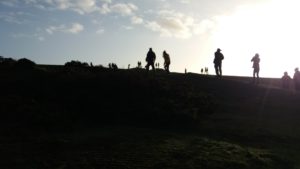I’m liking reading other people’s weeknotes, but my life doesn’t really have the tempo for that. I experimented with season notes for a while, but that involved too much preparation. So, let’s see how month-notes go.
January has been tricky. Christmas and New Year were a weird break to the rhythm of the new job. That, along with a bad back and sleeplessness, has made it hard to get into a rhythm.
But overall I’m continuing to enjoy my new role. I love working at a large company. The competent organisation and the number of people more than make up for the occasional and inevitable bureaucratic frustrations. I probably wouldn’t have liked this much before my 40s, but I am feeling suited to it now. I get to play with interesting systems and am learning lots of new tools. And I have a great team.
Coming off twitter has resulted in me consuming a large number of books. After being underwhelmed by my 2019 reading, I’ve been much more eager to abandon books I don’t like. I’m also been reading mostly fiction, after a few years of focussing on non-fiction. Initial highlights of 2020 are discovering NK Jemisin (thanks, Kate), Jennifer Egan and, somewhat belatedly, Benjamin Myers’ stunning novel Pig Iron.
I decided not to set any goals for 2020, but I have been trying to get my 10,000 steps in every day. My total for January was 379,133, which is an average of 12,230. My record was 23,924 when I went on the BEC hike. My lowest count was 10,103. I am going to ratchet up my goal for February to that number and see if I can push myself more.
I found myself lusting after idli, and persuaded my friend E. to cook some for me:

I watched 3½ films. 1917 was thrilling but somehow empty and deserves a post of its own. I enjoyed Midsomar far more: despite claiming not to be a horror director, Ari Aster’s first two films have been well within that genre. The other film I saw, I’m not copping to in public, and the half was the first two parts of 1965 film Kwaidan, which I saw at a night of films about hair:

Luke Wright’s new book The Remains of Logan Dankworth was published, and I read it the night it arrived. I can’t wait to see it performed live, and I’m eagerly waiting for a local date to be announced. It’s a great play, with some amazing lines.

Rosy was interviewed on the Cast Iron podcast. It’s fascinating hearing a friend talk about their life in a completely different context. I’m very excited about seeing her new play Musclebound in the Brighton Fringe.

I ended the month at the Blake exhibition. John Higgs was hosting a panel, after which I had an hour in the gallery. The show was breathtaking, and did a good job of communicating Blake to someone who hasn’t previously felt much affinity with his work. I arrived back in Brighton just before midnight and the start of February.
January is not a month for big things, but I’ve set a good start to the year. This month was work, sleep, read, walking and a little writing.

And I almost forgot – I published a little book, Cows Don’t Believe in Slaughterhouses. But I posted about that on Thursday.





















